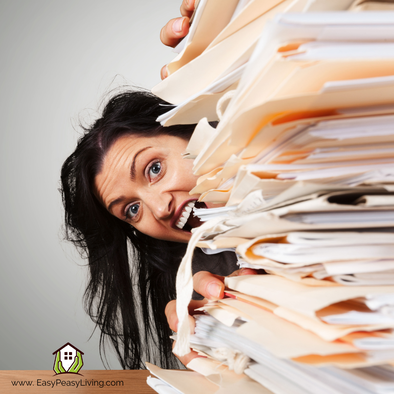 Piles of papers make me anxious. You will not find stacks of paper anywhere in my home. I dispose of any random slips of paper found in my pockets, purse or car as eagerly as tossing out used tissues. When I see unfiled papers, I see unmade decisions, incomplete tasks, and uncertainty, all of which provoke in me a sense of dread and anxiety. So keeping up with my daily influx of paper is my #1 organizing priority. Believe it or not, taming your own paper dragon can be as easy as changing a few bad habits and adopting one new one. Nine bad habits that can lead to paper pileup: 1) Clipping coupons - Let's be honest...there are a very few people out there who do couponing well. The rest of us are just kidding ourselves. Unless you are a serious couponer who has a proven system that works, accept the fact that the time and effort you are wasting on clipping, saving, and organizing coupons that rarely get used before they expire might be better spent actually processing your mail instead. Toss all coupons but the ones you know you will 100% use. No, you don't need to look through them to see what you're missing. Your time is worth more than the few cents you might save. 2) Saving articles, ideas, recipes, or brochures for "future reference" - These days, very little of what we find in newspapers and magazines is not also available for free online. Chances are that it will take more time/effort for you to find a clipping you saved when you are ready to refer to it than it will to just Google it and find it online instead. Information on events can usually be found on an organization's website. Pinterest is great for finding and bookmarking decorating, entertaining, fashion, gift, and cooking ideas. You can bookmark links to relevant articles which are also often archived online by publication. If you really need to, you can maintain a list in your phone of places you hope to someday visit, helpful websites, names of recipe or other topic sources, etc. to help you find something later. There's no need to keep a stash of old clippings. 3) Using paper piles as a tickler for action items - Instead of creating an action pile, create an action file. Put the papers away and enter a reminder in your phone or calendar or on your to-do list to make sure nothing falls through the cracks. Get in the habit of consulting these tools daily, or ask Alexa or Siri to remind you. Using the papers themselves as your tickler is ineffective because over time, as the paper clutter increases, they are likely to get lost or overlooked. By filing them, you will know exactly where to find what you need when you are ready to complete the task. The key is developing a system you trust for keeping your action tasks front and center in your mind, rather than on your desk or table. 4) Keeping papers out of fear/uncertainty - Do you really need to keep those old statements...receipts...canceled checks? Many people save old records unnecessarily because they think they may need them later. While it is true that there are definitely some important documents you should archive, many of us save papers unnecessarily "just to be on the safe side". it's worth taking the time to educate yourself on what you should keep and what can be tossed so that you can free up some space in your filing cabinet and make the filing chore less cumbersome. You'll find a downloadable guide here to get you started. Download the FREE Easy Peasy Paper Tamer Bundle for suggestions on what documents to keep and for how long. You can also check with your accountant or financial advisor if you're uncertain if you really need it. Just don't keep papers by default simply because you don't know whether or not you can safely get rid of them. 5) Saving information for others - Stop saving clipped articles for someone you think might find them interesting! Chances are, you will forget to give it to them, and they may prefer a text telling them where to find it online anyway. While it's nice that you are thinking of them, most people don't want more paper to deal with! 6) Saving papers to scan later - If you really want to scan it, scan it right away or schedule an appointment in your calendar for scanning everything and keep that appointment. Almost everyone I know with a "to scan" pile never gets around to scanning it and ends up eventually just tossing the whole pile. 7) Hoarding old magazines/newspapers - Keep only the current issue. If you haven't read it by the time the new issue arrives, toss it. If you find you aren't reading most of them, you should cancel your subscription. I'll bet you've never heard of anyone dying or suffering a significant consequence simply because they missed reading an issue of their favorite magazine...BUT, stacks of magazines and newspapers can present a dangerous fire hazard! 8) Reading/opening junk mail - Ignore the obvious junk mail! It's only purpose is to get you to buy something. If you truly need something, you'll remember without the solicitation and will seek out information on available options at the time you're ready to actually make a purchase. Tossing your junk mail will help you resist the temptation to acquire unwanted items that will only clutter up your home. If you feel a cursory glance is necessary, do it on the way in from the mailbox and then trash the sales pitch right away. It should never even touch any surface in your home! 9) Believing you have to shred everything - It may come as a surprise to many that your address is public information. Shredding everything will not keep it out of the hands of nefarious forces, unfortunately. You only need to shred items with sensitive information such as complete account numbers, your social security number, your tax ID, etc. Receipts that only contain the last four digits of your credit card number do not need to be shredded. Reviewing your credit report each year from each of the major reporting companies is helpful in protecting yourself against identity theft. If you have a large amount of old papers that really do require shredding, consider paying to have it shredded, or look out for free community shredding events in your local area to get it out of your way. Invest in a home shredder and keep it handy to shred as you go so that it doesn't continue to pile up. One new habit to adopt: Go through all incoming papers and mail each and every day before you go to bed and decide what to do with each piece. If you keep up with this, it should not take you more than 5-10 minutes per day to keep your surfaces clear of paper clutter once you get rid of your backlog. Set up a simple paper triage system to help you keep your papers neat, organized and put away out of sight (yes, that's right...see #3 above for why this is a good thing!) until you can complete any next steps like paying the bills or making a follow-up phone call. There are specific instructions in the FREE Paper Tamer Guide on how to set up and use a simple daily paper triage system to help you convert your paper piles into labeled files that are easier to manage. With a little discipline and a large recycle bin, even preventing paper pileup can be easy peasy!
0 Comments
Leave a Reply. |
AuthorValerie Sheridan is a professional organizer, wife, mother of two, and Founder/Owner of EasyPeasy Living. Archives
October 2022
Categories
All
|

 RSS Feed
RSS Feed